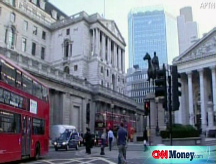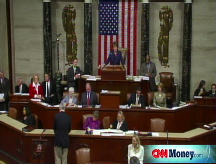Market meltdown: Global problem, global cure
Investing experts say Europe needs to address its banking problems to get markets back on track - but stocks may almost be cheap enough to attract more foreign cash.
NEW YORK (CNNMoney.com) -- Global stock markets are in free fall Monday as European banks are starting to look like they may need their own bailout.
In fact, several large financial institutions across the pond are already being propped up by European governments and private institutions.
Germany, Ireland, Iceland and Greece have taken steps to guarantee savings deposits, for example.
The German government also agreed to bailout commercial property lender Hypo Real Estate AG. And French bank BNP Paribas agreed to take over the majority stake in the Belgian and Luxembourg operations of beleaguered bank Fortis NV.
Europe's woes contributed to a massive selloff in U.S. stocks: The Dow Jones industrial average plunged more than 800 points Monday afternoon and dipped below the 10,000 mark for the first time in nearly four years. But stocks recovered more than half of their losses late in the day; the Dow finished down about 370 points.
So what does this all mean and how much worse can it get?
Some market strategists suggested that the market's equivalent of the Nestea plunge Monday had more to do with Europe's problems than a lack of confidence in the U.S. bank bailout that was signed into law last week.
"I don't think the problem is the U.S. bailout package. This sell-off is directly due to inaction by Europe," said Subodh Kumar, an independent market strategist based in Toronto. "The Europeans have been blaming Americans for the crisis for some time but there needs to be a major restructuring package of some type from Europe for their banks."
The big problem now though is that even though stocks have already taken a huge hit around the world this year and may seem cheap, that is being trumped by psychology and sentiment.
"It's anybody's guess how much longer this correction will go on," said Claudio Brocado, portfolio manager with the emerging markets team for Batterymarch Financial Management in Boston. "Valuations have been very cheap in many markets but they've been cheap for a while. Fundamentals are not important in the near-term."
In other words, even though stocks may seem to be priced for a worst-case scenario, i.e. a prolonged global recession, few investors are brave enough to step in right now and call a bottom and start bargain hunting. And that may not change until Europe makes more decisive moves to stem the bleeding.
"It seems that the markets are expecting more coordinated policy actions by developed markets to address the crisis. In the meantime, there is a complete loss of confidence," Brocado said.
And another portfolio manager said that there is little faith that any of the numbers being reported by banks right now are actually legitimate. Until trust returns, it's hard to imagine a restoration of confidence in the markets.
"What's the P/E ratio if you can't trust the E?" said Paul Ehrlichman, chief investment officer with Global Currents Investment Management in Wilmington, Del., talking about price-to-earnings ratios. "We're in the process of everybody coming clean."
Nonetheless, Kumar thinks that stocks, particularly for some big banks, may be nearing a level that are cheap enough to attract investors that have a lot of cash sitting on the sidelines: sovereign wealth funds in Asia and the Middle East.
Julian Thompson, portfolio manager with the Threadneedle Emerging Markets fund in London, agrees.
He said that because many banks based outside of Europe and the United States did not rely as much on the types of leveraged bets that have torpedoed many banks in developed nations, the economies of these emerging market countries may hold up much better than Europe and America.
As such, sovereign wealth funds in places like Asia and the Middle East are in a better position to invest. The question though is when do they see fit to pull the trigger?
"Certainly they are the ones who have the dollars right now," Thompson said. "But they have had their fingers burned earlier on in the crisis," he added, referring to some sovereign wealth investments in Merrill Lynch (MER, Fortune 500), Citigroup (C, Fortune 500) and UBS (UBS), to name a few.
"At some point, emerging markets will probably bailout out developing markets. It's inevitable but the issue is one of timing," Thompson said.
Ehrlichman thinks it will also be a while before investors are confident enough to wade back into the markets. But he said that the selloff is encouraging for one good reason.
"We do see some glimmers of hope. Unsustainable business models are being punished and global imbalances are getting corrected," he said. "The inmates have been running the asylum and now that's ending." ![]()




